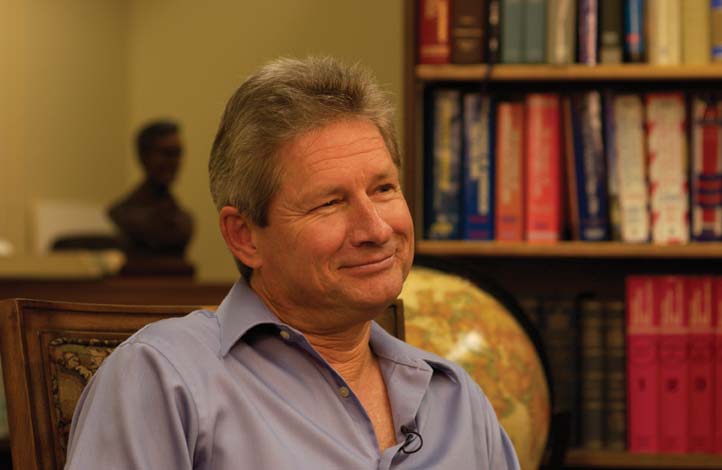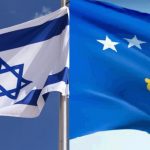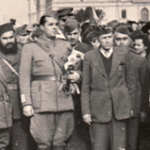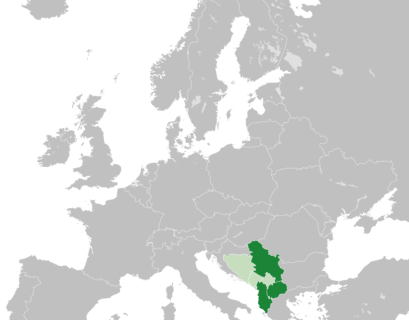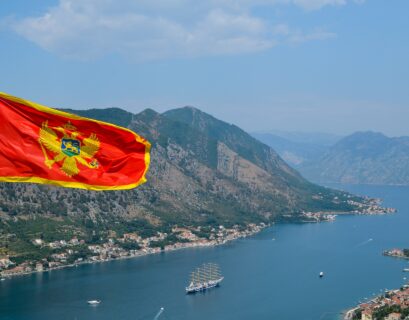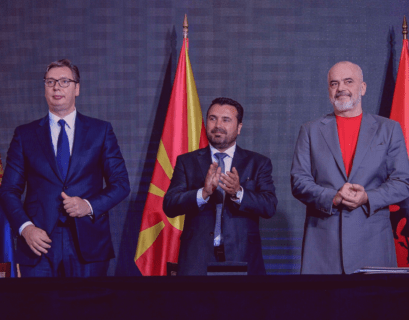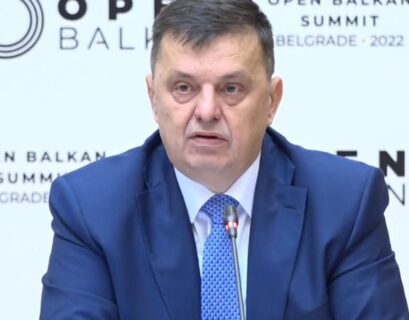Prof. Bernd Fischer
The manipulation of history for political purposes is of course a deeply entrenched tradition which can be found virtually everywhere in the world. History can be a powerful tool and political leaders often are unwilling to forego the potential benefits of directed historical revisionism. The benefits are many and include the simple process of building loyalty among the citizen base at an early age through the control of textbooks in schools. Other potential benefits include historical manipulation to legitimize a regime and to justify past decisions, as well as to legitimize specific policies followed by a regime. There certainly are many more uses and it is clear that all states engage in this type of practice. In this regard, Albania is of course no exception. Still, it might be argued that given the attention that some Albanian regimes have given to this process, it is perhaps more intense and deeply rooted and therefore more difficult to expunge.
The regime of Enver Hoxha and its successor fledgling democratic regimes have engaged in extensive historical manipulation for political purposes. While many aspects of Albanian and Balkan history were, and in some cases still are, subjected to this process, none has received more intense focus than the history of the Second World War. This is perhaps not surprising since World War II in Albania became not only the foundation but also the foundation myth for Enver Hoxha’s command Socialist state and continues to have a strong hold on many aspects of the contemporary Albanian world. Just this past July 2020 parliament rank out with shouts of “communist, and ballist” as the pm explained that the right-wing movements during the war did not fire a shot, instead spending their time stealing chickens. Rarely has an event so dominated a national psyche for such an extended period of time – particularly since in relation to Albania’s neighbors which experienced many of the same patterns of collaboration and resistance, Albania was, at least relatively, less affected by the war. While the war remained something of a principal theme during the Socialist period, with the collapse of Communism the war was reexamined and elements were found to support a multitude of historical agendas, rather than just one. The war can serve as a case study of the politicization of history in Albania.
Albania can be seen as a microcosm of the war in the rest of the Balkans and in Europe as a whole. Albania suffered from all of the same complexities, if not more. In the short run, the Italian invasion and the subsequent German invasion were unsuccessfully resisted by the brave few.[1] Collaborators were found to participate in puppet regimes, and resistance was organized to punish the traitors and expel the invaders. As is true in other areas of Europe, resistance fragmented along political and regional lines. The Allies often found it difficult to decide which group or groups to favor, but nevertheless played an important role in encouraging the resistance by helping to provide organization, leadership, and principally, supplies.[2] The invaders ultimately withdrew and the collaborators were liquidated, as in other areas of Europe.
But Albania’s unique internal conditions produced significant variations, and below a familiar surface the complications were extensive, resulting in ambiguities and historical controversy. During the Italian occupation the fragmentation among the resistance, for example, was more severe than in other parts of the Balkans and in Europe. The most effective of these groups of course where the Communists. The war created and sustained Enver Hoxha and his movement in a very literal sense. The war allowed Hoxha to demonstrate his political acumen and his ability to identify effective military leadership, having little experience or talent in that respect on his own. Although less true of the Communists, many of the other resistance groups proved to be inconsistent, occasionally cooperating with the invader, then turning to resistance, then reverting to cooperation. This vacillation was not the result of any affinity for fascism but rather, at least in part, can be explained by the lack of a fully developed sense of modern nationalism. As a result, the reaction of individual groups often depended principally on regional and local considerations. This lack of a fully developed nationalism also determined the response of many of the tribal chieftains to the invaders; they looked to play the various centers of power off against each other and thereby achieve some advantage for their areas.
Many aspects of Albania’s experience under the German occupation was also unique and controversial. Albania’s particular internal conditions, as well as German needs, allowed for the creation of some surprisingly independent occupation regimes. These puppet governments, many of which ignored most outward signs of fascism and introduced reformist political and economic policy, gained as least some popularity. Much of this came as a surprise to both the Germans and the Allies, sending both scrambling for useful information upon which to construct an effective policy. In the long run neither side succeeded in completely understanding the Albanians, and both failed to effectively control the situation on the ground.
Although both the Allies and the Axis failed, the impact of their struggle was, of course, crucial for the Albanians. In the short term the Axis provided some immediate economic relief through extensive investment and employment. But as the war dragged on, the prewar political structure was destroyed, the social structure undermined, and these early economic advantages melted away in corruption, confiscation and wartime destruction. The Allies, on the other hand, provided the Albanian resistance not only with an ideology and an organizational structure, but also with a considerable amount of the material resources required to conduct effective resistance.
The war’s long term impact – as in other areas of Europe – was profound and often paradoxical. The war changed everything. Axis policy was principally responsible for guaranteeing that the prewar political and social structure could not be resurrected.
The wartime experience forcibly brought Albania into contact with various groups of foreigners, their ideas and their guns. But while Albanians were exposed to the outside world as perhaps never before, the experience of the war also helped to reinforce suspicions of foreign entanglements, a notion which was strengthened and exploited by Hoxha’s command Socialist regime in the postwar world. Enver Hoxha found that Albania’s experience with the war was one of his most useful tools in achieving his occasionally laudable goals. The war was also used by Hoxha for legitimizing and maintaining power based upon an ideology rather alien to the average Albanian. Hoxha concluded that these goals could only be achieved through the extension of the wartime struggle by the eventual establishment of a state-of-siege or garrison-state mentality, which emphasized the continuing and growing dangers that foreigners represented.
The war, then, essentially created Hoxha and his movement and it would do much to help sustain both as the principal foundation myth, something which all states and nations, of course, require.[3] The war would become one of the central focal points for much of post-war Albanian culture, and ultimately constituted a profoundly stultifying influence. Writers used the war as the major theme of many of their works: Albania art, drama, film and music and of course education – textbooks, traditional histories, even literature for children were never completely allowed to separate themselves for the anti-fascist struggle.[4]
The role of Socialist historians in this process was quite clear. Myths exist uneasily with ambiguities, and it was the task of the historian to increase the effectiveness of the myth by removing the inconvenient ambiguities, to make it all simple and clear. Socialist academics, who were often very good historians but did not always produce very good modern history, incorporated the war into the developing ideology.
There were many wartime themes that required some degree of cleansing and most are of course related. Let us briefly look at some that have occurred to this author. First and foremost is the central theme of the role of Hoxha and the partisans in resisting and then expelling the invaders. Resistance itself was predated – to even before the formation of the party.[5] This is a traditional theme for Communists throughout Europe, who still chafe under the accusation that no resistance was mounted until after the invasion of Russia, and need not occupy us much here. More importantly, there were to be no questions about the Germans just having withdrawn from Albania as a result of events elsewhere, although this is of course the case. The partisans were rarely able to hold fixed positions if these positions threatened German lines of communications or German security in general.
But this, of course, was not an acceptable interpretation so a simpler and clearer one was created containing what can only be described as stunning exaggerations. The partisans, who, we are told, were all talented warriors, defeated the Germans and drove them out of Albania. We are further told that “every partisan was a brilliant sharp shooter” and that “Our national liberation army was able, relying only on its forces, to liberate the whole of the country from the Italian and German invaders and the rule of the exploiting classes which had placed themselves in the service of the foreign invader.”[6] This was simple and clear, and above all useful.
Another central theme, very much related to the one above, involved the nature of the Albanian on Albanian struggle. During the war, in the communiqués of both the Allies and the Axis, the struggle was referred to as a civil war – a struggle between the partisans on the one hand, and the Balli Kombëtar, the Zoggist and the independent chieftains on the other. Once the war was over, Socialist historians needed to produce another formula, since the concept of a civil war at least suggests an element of proportional equality, and does, in a way, legitimize both sides. This, of course, was unacceptable so all of those who resisted the partisans became traitors, whether they had cooperated with the Axis of not.
It was also of some importance that all of the achievements of the partisans were accomplished by the partisans alone. This naturally did much to legitimize the regime and became even more imperative once relations with one-time allies began to sour. This souring happened first with the British, so their role in supplying the partisans with war materials needed to be minimized. The partisans had won themselves. This had to be true with regard to the Yugoslavs as well, particularly after the Soviet-Yugoslav break in 1948. While there were a number of issues of importance with regard to the Yugoslavs, the most significant was the role of the Yugoslavs in the foundation of the Albanian Communist Party. That the Yugoslavs played a very active role is clear – but inconvenient. In most cases, Albanian Socialist historiography fails to mention the Yugoslavs – or when they are mentioned they are described as gangsters and meddlers – giving all credit to the Albanian leadership, which was spurred into action by the need to resist the Italians and by the German invasion of the Soviet Union.
The role of the Germans has naturally also led to a series of questions which needed to be resolved. One of the more subtle questions has to do with the role the Germans played in facilitating the partisan rise to power. It seems clear that the Germans, while perhaps not intending to, did much to insure Communist success by, to a greater or lesser degree, co-opting all the other principal contenders for power, a process which was not unique to Albania. Since the BK, the Zoggists and the independent chieftains represented the pre-war social structure, there was some expectation that they would provide security for their population. When resistance resulted in reprisals, in most cases resistance was suspended and the Communists became the principal enemy. This, perhaps inevitably, forced some of the non-Communist resistance into tacit or direct cooperation with the invaders, thereby eventually removing them as serious contenders for power in post-war Albania. The Germans, then, unwittingly did the partisans a tremendous service. Since this, too, contradicted the post-war certainty that the “national liberation army, relying only on its own forces, liberated” etc. etc. this could not, and did not, become an issue to be discussed in the historical community.
The role of the Germans has also engendered one the most longstanding disputes related to the war – something rather superficial but of critical importance because it deals with symbols – and that is the date of the liberation of Shkodra and the expulsion of the Germans from Albania. While it is likely impossible to tell when the last German actually left Albania, 29 November was chosen during the Socialist period, in part because the date corresponded to its Yugoslav counterpart. Twenty-nine November henceforth became the Albanian liberation day and the country’s principal holiday, superseding 28 November, the day on which Albanians have traditionally celebrated their independence. This, as we shall see, has remained a delicate topic and has become something of a flashpoint for the debate between Socialist and post-Socialist historiography.
In all of this historical cleansing the agenda of course was the Communist struggle against overwhelming foreign invaders and domestic traitors securing the victory by themselves under the leadership of the party, with Hoxha at the helm. These themes were continually reemphasized by constant reminders that the enemies were still at the gates necessitating a state of siege mentality and eventually a partisan strategy of a people’s war – the mobilization of the masses for a struggle against the invader. These themes remained relatively intact at least until the death of Hoxha in 1985.
With the collapse of Communism, however, a thorough reexamination of the some of these foundation myths began, the process of which is still on-going and can be quite positive. But in this case the reexamination also resulted in the establishment of new historical agendas and new dilemmas in terms of the war. In its simplest sense, Hoxhaism was quickly supplemented by nationalism and anti-Communism. While Hoxhaism included an element of nationalism, the post-Communist period saw the rise of a new (or at least new for Albania in the post-war period) nationalism which contained elements of what we might call traditional or irredentist nationalism, which focused on historical heroes and occasionally militated for an ethnic Albania.
As with most institutions in Albania, when the Democrats came to power in 1992, a new politically appointed leadership in the academic community emerged which initiated something of a purge of the rank and file. These changes engendered, among other things, a new discourse which disparaged the past and promised a new era in scholarship with Socialist era historiography now being considered “non-scientific.” To reject Hoxha required rejecting the historical pillars upon which he built his power. This process included the rehabilitation of historical figures and events, in particular those from the Second World War since this era was considered one of the most politicized. In general this meant an attack on a historiography based largely on dialectical materialism – to be replaced by one aimed against Marxism-Leninism and Communism in Albania. This included a revision of the periodization of history, away from economic developments as the key. Many of the new, or reformed, historians did away with the notion of a capitalist and Socialist Albania. The new, or rather, traditional nationalism was emphasized and Kosova became an important theme with historians being critical of the Party of Labor for paying insufficient attention to Kosova– and for its passive acceptance of Kosova’s reintegration into Yugoslavia following the war. Some historians rehabilitated the Balli Kombëtar by attributing to it an important role in the country’s anti-fascist struggle.
The date of Albania’s liberation was of course revisited and once again and politics intervened decisively. President Sali Berisha appointed a twelve member commission to determine the “true date” of the withdrawal of the Germans from Shkodra. The commission concluded that the Communists had been pressured by the Yugoslavs to accept 29 November as the date of liberation. Twenty-eight November was determined to be the true date of the liberation, principally, in seems, because of the significance of that date in Albanian history, Skënderbeg raising the flag in Kruja, and of course Ismail Qemal raising the national flag in 1912. The commission concluded the “November 28, 1944 stands rooted together with the above events and testifies to the deep patriotism felt by Albanians and their massive readiness to fight with self-affirmation against foreign occupiers however strong they may be…Let us hope that we will have even more November 28ths in the future.”[7] To the credit of Albanian historians, some certainly questioned the motives behind this revisionism and others were quite critical of the textbooks produced based upon this new historical agenda.
When the Socialists came back to power in 1997, there was again a certain shift – although perhaps not quite as substantial as that of 1993. Although not nearly as strident as in the past, some traditional Socialist themes were reemphasized, in particular the 29 November date for the celebration of the liberation. The Socialist dominated parliament declared that the official ceremonies commemorating Liberation Day would again be held on the 29 November.
So where are we now? As soon as he returned to power in 2005, Sali Berisha declared 28 November as the day that both independence and liberation would be celebrated. The opposition and the Association of War Veterans denounced the violation of the symbols of the Anti-fascist National Liberation war and the feelings of those who sacrificed their blood for the liberation, and suggested that the government’s decision ran contrary to history and the sentiments of the Albanian people. The Socialists went on to celebrate on 29 November under the motto of “White Night.” and have essentially maintained that position since returning to power in 2013.
This increased plurality of voices in the political realm, has encouraged a plurality of voices in the historical community in relation to interpretations of the war – although some, but by no means all of these voices remain rather strident and polarized. There appear to be two (or three – depending how you count them) main trends in terms of the war in Albania at this point, rather linked to contemporary politics, one closer to the traditional leftist position and one closer to the rightist position.[8] Those who support the former position see the National Liberation war as a civil war in part, although there are also those who might be called nostalgics who focus on the heroic aspects of the war. They see the war as a partisan war which therefore places Albania among the ranks of the victorious forces after the Second World War. But within this group there are the so-called moderates who argue that it is not possible to have a civil war in a country occupied by foreign forces. To have a civil war there must be two forces contending for power and not a foreign occupier in the middle. In general the moderates argue that the war was a war of liberation but with some aspects of a civil war. Some in this group do not blame the entire BK, some of whom were Noli people. They would argue that the BK made a mistake by not fighting. But they also identify a more radical wing of the BK which supported fighting the occupation, but never managed to get the upper hand in the organization. This view suggests that the Albanian dictatorship would not have been so total and so radical had the BK been more actively involved in the war. The rightists, on the other hand, argue that the war was definitely a civil war with the Communists fighting firstly for domestic power from the very beginning. The rightists argue that the Communists betrayed Kosova, were organized by the Serbs and essentially joined the age-old enemy.
Despite the continuation of this politically inspired controversy, there is now a plurality of voices which one would hope will eventually entirely remove the history of the war from political agendas, where this has not been done already. This is a difficult process on a number of different levels. First, we are of course all biased in one way or another, whether we are willing to admit it or not. But part of what we do as academics is to actively and carefully minimize the natural bias in our work. This is our collective responsibility. And then, on a more official level, all regimes, often supported by affiliated institutions, attempt to influence the interpretation of particular aspects of principally national history. Like personal bias, this too is a difficult process to overcome, but again it is the professional responsibility of academics to militate against this high-jacking of history. I am very gratified to note that the struggle to remove, or at least to minimize the impact of, political agendas from history, including the history of the Second World War in Albania, is well underway.
Bernd Fischer is Professor at Purdue University Fort Wayne, Indiana and Senior Associate Fellow of the Albanian Institute for International Studies.
[1] The Zoggist commander Abas Kupi offered determined resistance at Durrës. See Bernd J. Fischer Albania at War, 1939-1945 (London: C. Hurst and Co., 1999), p. 22.
[2] Reginald Hibbert Albania’s National Liberation Struggle (London: Pinter, 1991), p. 113.
[3] For a brief examination of the myths surrounding Hoxha’s person see M.J. Alex Standish, “Enver Hoxha’s Role in the Development of Socialist Albanian Myths,” in Stephanie Schwandner-Sievers and Bernd J. Fischer, ed., Albanian Identities, Myth and History (London: C. Hurst and Co., 2002)
[4] Arshi Pipa Albanian Stalinism: Ideo-Political Aspects (New York: Columbia University Press/Eastern European Monographs, 1990) p. 121.
[5] Fischer, Albania at War, p. 111.
[6] Lefter Kasneci, Steeled in the Heat of Battle: A Brief Survey of the National Liberation War of the Albanian People, 1941-1945 (Tirana: Naim Frashëri 1966), p. 29; Mehmet Shehu, On the Experience of the National Liberation War and the Development of Our National Army, (Tirana: 8 Nëntori 1978), p. 116.
[7] I am grateful to Daniel Perez of Stanford University who has allowed me to cite his manuscript “Rewriting History after Communism: Negotiation and Debate at Albania’s Institute of History (1993-1997), p. 10.
[8] I am grateful to my colleague Artan Puto for conducting an informal poll of the Albanian historical community on this issue.


